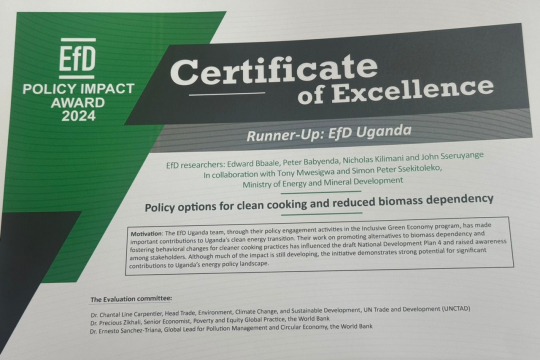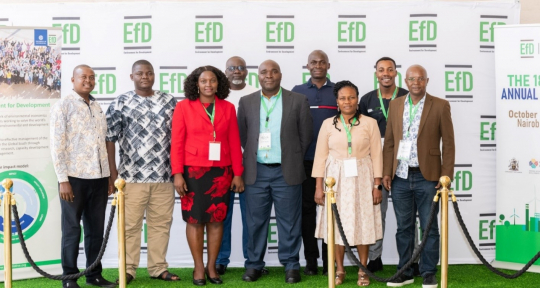The Environment for Development (EfD) Uganda team, led by Centre Director Edward Bbaale, has been recognized as runners-up for the prestigious EfD Policy Impact Award 2024. Their impactful paper, titled Policy Options for Clean Cooking and Reduced Biomass Dependency, earned them a Certificate of Excellence during the 18th EfD Annual Meeting held from October 3 to 6, 2024, at the Argyle Grand Hotel in Nairobi, Kenya.
Organized by the EfD Global Hub at the University of Gothenburg and hosted by EfD Kenya at the University of Nairobi, the meeting brought together researchers and policymakers from across the world. The event celebrated the remarkable work being done to influence global environmental policies.
Representing Uganda, Center Director Edward Bbaale was accompanied by Gyaviira Ssewankambo, EfD-Mak’s Office Manager, and a team of researchers and collaborators. They included Peter Babyenda, Susan Kavuma, John Sseruyange, Nicholas Kilimani, Florence Lwiza Nsereko, Jordan Ssemwanga, Nathan Mununuzi (Ministry of Water and Environment), and Eng. Dominic Mucunguzi (Ministry of Agriculture, Animal Industry, and Fisheries).
Insights from the study
The study, led by Edward Bbaale and his research fellows, Peter Babyenda, John Sseruyange, and Nick Kilimani, focused on Promoting Inclusive Clean Energy Transition in Uganda: Evidence, Challenges, and Policy Options. The research explored perceptions of cooking energy systems in Uganda, with an emphasis on the over-reliance on biomass, particularly charcoal, as the primary energy source in low-income areas.
The study revealed key barriers to the clean energy transition, including fear of electricity and liquid petroleum gas, weak public awareness, and insufficient regulatory frameworks. These challenges have slowed the adoption of alternative energy solutions in Ugandan households.
Edward Bbaale emphasized the need for stronger regulatory support and awareness to foster the country’s energy transition:
"The transition to cleaner energy requires overcoming public misconceptions and improving regulatory systems to promote sustainable cooking solutions."
Edward Bbaale speaks on Sustainable energy transitions in Uganda and the role of Energy Efficiency. Video clip courtesy of the EfD Global Hub: https://play.gu.se/media/Edward%20Bbaale%20-%20Sustainable%20energy%20t…
Peter Babyenda speaks on the transition to clean cooking technologies in Uganda. Interview and video clip published by EfD Global hub: https://play.gu.se/media/Peter%20Babyenda%20-%20Embracing%20clean%20coo…
Early Career researchers graduate and receive diplomas
Dr. John Sseruyange and Dr. Florence Lwiza received prestigious EfD diplomas after graduating from the highly regarded EfD Young Professionals Program. Both were nominated by the EfD-Mak Director to participate in this capacity-building program.
This achievement celebrates their remarkable progress through a transformative program that nurtures emerging leaders in environmental research and policy. Their success is a testament to their hard work, dedication, and the bright future they hold as they continue to contribute meaningfully to the field.
EfD-Mak's growing impact
Edward Bbaale highlighted the value of the 18th AGM for fostering collaboration and growth within the EfD network.
"The EfD-Mak center appreciates the efforts of colleagues who submitted proposals and papers, and we congratulate Dr. Lwiza and Dr. Kavuma for their contributions. These proposals are vital to keeping the center running," he noted.
Looking ahead, he encouraged further mobilization of research fellows, recommending the appointment of collaborative leaders and co-leaders to enhance engagement and productivity within the center.
The EfD-Mak center’s research has continued to make waves, including a recent presentation to Parliament in May 2024, where the team advocated for regulatory frameworks to support the transition to clean energy in Uganda (https://news.mak.ac.ug/2024/05/efd-takes-research-findings-to-parliamen…)
Fellows present research papers on key environmental and economic issues
Five significant research papers were presented, each addressing critical issues related to sustainability, climate change, and economic development in Uganda and beyond.
Dr. Susan Kavuma presented her proposal titled "A Quasi-Experimental Analysis on the Gender Costs of Biomass Dependency in Uganda." Her research explores the economic and social burdens that women face due to the reliance on biomass as a primary energy source, a pressing issue in Uganda's rural communities.
Dr. Florence Lwiza Nsereko discussed her proposal "Climate Change and Agricultural Trade in Sub-Saharan Africa: Implications for Regional Market Integration." Dr. Nsereko's study, conducted alongside co-researcher Prof. Johnny Mugisa, examines how climate change impacts agricultural trade and regional market integration across Sub-Saharan Africa.
Dr. John Sseruyange presented his research paper titled "Public Acceptance of a Deposit Refund to Reduce Plastic Pollution in Uganda." His work assesses how a deposit refund system could help combat the growing issue of plastic waste in Uganda. In addition, Dr. Sseruyange served as the main discussant for Dr. Phu Le's paper "Residential Electricity Efficiency and Implications for Vietnam’s Clean Energy Transition," providing insights into clean energy initiatives.
Dr. Peter Babyenda shared findings on the "Socio-Economic Impacts of Reforestation Initiatives on Energy Poverty in Three Ugandan Districts - Hoima, Dokolo, and Nakasongola." His research highlights the positive effects of reforestation projects on reducing energy poverty in Uganda, an important issue in the country's sustainability efforts.
Dr. Nicholas Kilimani presented a comprehensive report on his project titled "Solar-Powered Irrigation Systems for Resilience to Climate Change: An Economic Viability Analysis." Alongside his team—Eng. Dominic Mucunguzi, Mr. Nathan Mununuzi, and Mr. Jordan Ssemwanga—Dr. Kilimani's multi-country research focuses on the feasibility of solar-powered irrigation as a means to boost agricultural productivity and enhance climate resilience.
Finally, Mr. Gyaviira Ssewankambo and other support staff from the EfD Network received capacity-building training facilitated by UGOT. The workshops covered essential topics such as quality assurance, budget management, financial templates, and center audits.
By Jane Anyango
Communication Officer.


